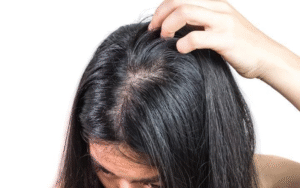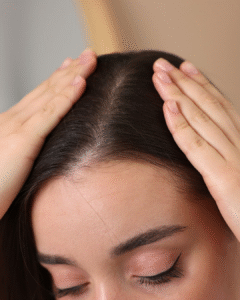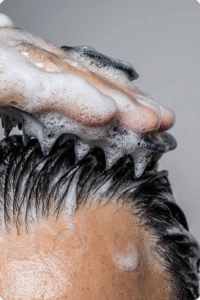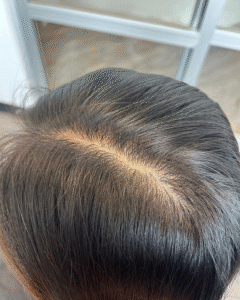How to Detox Your Scalp After Diwali: Natural Remedies That Actually Work
1: Understand Why Your Scalp Needs a Detox
- Effects of Diwali Pollution, Dust, and Smoke on Your Scalp
- Your hair and scalp are subjected to a variety of stresses during Diwali, including heavy dust, pollution, cracker smoke, and even too much perspiration from the celebrations.
- Post-Diwali Scalp Detox These contaminants accumulate on your scalp and block pores, which lowers the amount of oxygen that reaches your hair follicles.
- The outcome? oily, lifeless hair, more dandruff, and possibly hair loss.
- The scalp barrier is weakened by pollutants such as sulfur compounds and carbon particles, which causes inflammation and discomfort.
- The natural oil balance of the scalp may be upset over time by these pollutants, resulting in an overly dry or oily scalp.

- How Styling Products and Sweat Block Hair Follicles
- Your hair and scalp are subjected to a variety of stresses during Diwali, including heavy dust, pollution, cracker smoke, and even too much perspiration from the celebrations.
- These contaminants accumulate on your scalp and block pores, which lowers the amount of oxygen that reaches your hair follicles.
- The outcome? oily, lifeless hair, more dandruff, and possibly hair loss.
- The scalp barrier is weakened by pollutants such as sulfur compounds and carbon particles, which causes inflammation and discomfort.
- The natural oil balance of the scalp may be upset over time by these pollutants, resulting in an overly dry or oily scalp.
- Signs Your Scalp Needs Detox
- A scalp detox becomes essential when you notice symptoms like persistent itchiness, dandruff, greasiness, or hair that feels heavy even after washing.
- If your roots become oily within a day or your hair lacks volume and bounce, these are early warnings. You might also notice flakes, foul odor, or slower hair growth.
- A healthy scalp should feel clean, relaxed, and balanced — not tight or irritated. Detoxifying helps restore this balance by unclogging pores, removing toxins, and reviving your scalp’s natural ecosystem.
- Dermatologists stress that just as important as skincare exfoliation is a scalp cleanse.
- While regular washing simply cleans the surface, detox treatments remove dead cells, pollutants, and poisons from the body.
- Detoxing revitalizes the scalp, encourages stronger follicles, and enhances overall hair structure, particularly after Diwali when exposure to environmental stress is high.
- Restoring the health of your scalp begins with understanding why it requires detoxification. Imagine it as pressing the “reset button” for your hair, removing everything that is preventing it from receiving nourishment.
- Your scalp can breathe, absorb nutrients, and naturally promote the growth of healthy, glossy hair after it has been detoxified.
2: Start with a Gentle Scalp Cleanse
- Importance of Removing Buildup and Product Residue
- Your scalp frequently becomes a haven for pollution, perspiration, oils, and leftover styling products after the Diwali celebrations.
- Your scalp may get congested and lifeless if this residue is not entirely removed by even ordinary shampoos.
- Hair follicles become clogged when the scalp isn’t thoroughly cleaned, which inhibits normal growth and causes dandruff or itching. The first important step in detoxing your hair is to cleanse your scalp gently but effectively.
- Your hair stays smooth, nourished, and manageable when your scalp is clean, allowing natural oils to spread evenly throughout your strands.

- Natural Cleansers for Post-Diwali Detox
- Aloe Vera Gel: Aloe vera is a naturally occurring soother and purifier. It reduces inflammation and aids in the dissolution of impurities, product accumulation, and excess sebum. Rinse with a gentle shampoo after applying fresh aloe gel directly to your scalp and letting it sit for ten to fifteen minutes.
- Apple cider vinegar (ACV) is a natural clarifier that is well-known for balancing the pH of the scalp and eliminating residue. After shampooing, apply a solution of one part vinegar to three parts water to your scalp and rinse it off a few minutes later. It promotes a healthy sheen and aids with odor removal.
- Whether it’s tea tree oil or neem water, both have potent antibacterial qualities. They lessen itching and dandruff while cleansing and detoxifying the scalp. Neem leaves can be boiled in water, let to cool, and used as a last rinse. You can also incorporate a few drops of tea tree oil into your shampoo.
- Fuller’s earth, also known as Multani Mitti, is a natural clay that helps remove extra oil and debris from your scalp, leaving it feeling clean and fresh. Before washing, apply a mixture of multani mitti and aloe vera or rose water as a scalp mask for ten to fifteen minutes.
- Step-by-Step Scalp Cleansing Routine
- Pre-Cleanse: Start by applying a few drops of warm coconut or jojoba oil to loosen dirt and product buildup. Massage gently for 5–10 minutes.
- Cleanse: Use a sulfate-free, herbal shampoo or a DIY aloe-ACV mix to wash your scalp thoroughly. Focus on the roots rather than the ends.
- Rinse Well: Ensure no residue remains, as leftover shampoo can cause more buildup.
- Condition: Apply a lightweight, silicone-free conditioner to the ends to restore moisture.
- Finish with a Natural Rinse: End with an herbal or ACV rinse to close the hair cuticles and lock in shine.
3: Use Natural Remedies for Deep Detox
- After the Diwali celebrations, your scalp requires more than a simple cleanse — it needs a deep detox that restores balance and removes stubborn impurities. Natural scalp masks work wonders by pulling out toxins, unclogging follicles, and infusing nutrients directly into your scalp. These masks are gentle yet powerful, promoting long-term scalp health without harsh chemicals.

- Hibiscus & Yogurt Mask: Packed with amino acids, hibiscus blossoms fortify hair follicles and nourish roots. It turns into a cooling and purifying mask when combined with yogurt. Apply to your scalp after blending a few hibiscus petals with two tablespoons of yogurt. Before rinsing, let it sit for twenty minutes. This smoothes the rough texture of the scalp, imparts a natural sheen, and helps manage dandruff.
- Methi (Fenugreek) & Aloe Vera Pack: The anti-inflammatory and anti-fungal qualities of fenugreek seeds are well-known. Grind 2 teaspoons into a paste, combine with aloe vera gel, and soak overnight. After applying this mixture on your scalp, wait half an hour. It eliminates accumulation, fortifies hair roots, and stops hair loss brought on by pollutants after a festival.
- Green Tea & Lemon Rinse: Rich in antioxidants, green tea helps cleanse the scalp and combat free radicals. After washing, apply a mixture of one cup of chilled green tea and a few drops of lemon juice on your scalp. Hair follicles are strengthened, excess oil is reduced, and the scalp is revitalized by this herbal rinse.
- Benefits of Clay-Based Detox (Bentonite or Multani Mitti)
- An age-old beauty trick, clay masks are renowned for their thorough cleaning properties. Multani Mitti (Fuller’s Earth) and bentonite clay work like a magnet to remove excess oil, impurities, and toxins from your scalp. These clays create a creamy paste that purifies without drying out too much when combined with apple cider vinegar, aloe vera, or rose water.
- Evenly distribute the clay mask over your scalp, let it sit for ten to fifteen minutes, and then give it a good rinse. This all-natural solution reduces itching, encourages healthy hair development, and balances the oil production on your scalp.
- Herbal Rinses for Scalp Rejuvenation
- Herbal rinses are the best choice for organically preserving scalp health if you’d rather take a less drastic approach to detoxification:
- Amla Water: Provides shine, strengthens roots, and lessens dandruff.
- Rosemary water: Reduces inflammation of the scalp, promotes growth, and increases blood circulation.
- Neem infusion: helps manage dandruff, eliminates impurities, and combats bacteria.
- Prepare your preferred herbs by boiling them in water for ten to fifteen minutes, allowing them to cool, and then using them as the last rinse after shampooing. As tonics, these herbal waters maintain the balance and freshness of your scalp.
- Using natural remedies for deep scalp detox ensures your hair receives the care it deserves after Diwali. These DIY masks, clays, and herbal rinses not only remove impurities but also infuse your scalp with essential vitamins and minerals. With consistent care, your scalp becomes healthier, your hair grows stronger, and the post-festival dullness fades away completely.
4: Rebalance Scalp Health with Oils & Massage
- How Oil Massage Boosts Circulation and Hair Growth
- Rebalancing and nourishing your scalp with natural oils comes next after detoxing it. An ancient Ayurvedic technique, regular oil massages strengthen hair roots, promote scalp health, and increase overall hair vitality.
- A light scalp massage increases blood flow, which carries nutrients and oxygen straight to the hair follicles. Faster and healthier hair growth is the result of this enhanced influx of nutrients, which aids in cell regeneration.
- Additionally, a scalp massage eases tension and stress, two factors that might exacerbate hair loss. Applying gentle pressure in circular motions with your fingertips helps release tense scalp muscles, get rid of any remaining accumulation, and improve the way that oils and nutrients are absorbed.

- Best Post-Diwali Oils for Hair Nourishment
- Coconut Oil: Packed with antioxidants and fatty acids, coconut oil deeply enters the hair shaft to repair damage from pollutants and heat. Additionally, it keeps hair moisturized and stops protein loss.
- Bhringraj Oil: Often referred to as the “King of Herbs” for hair care, bhringraj oil revitalizes lifeless hair, encourages new hair growth, and lessens dandruff. It works particularly well for people whose hair is falling out after Diwali.
- Rosemary Oil :
- Thick, stronger hair is encouraged by rosemary oil, which has been scientifically shown to increase circulation and stimulate hair follicles. Before using, combine a few drops with a carrier oil (such as jojoba or coconut).
- Castor Oil:
- Castor oil, which is high in ricinoleic acid, gives hair a glossy finish, strengthens the roots, and lessens dryness. It works best when combined with lighter oils or used sparingly.
- Amla Oil: Rich in antioxidants and vitamin C, amla oil revitalizes the scalp, reduces dandruff, and gives hair strands a natural sheen.
- How to Properly Massage Your Scalp for Detox Benefits
- Step 1: Warm your chosen oil slightly to improve absorption.
- Step 2: Part your hair into sections and apply oil evenly across the scalp using your fingertips or a dropper.
- Step 3: Massage in gentle circular motions for 10–15 minutes, focusing on the crown and temples.
- Step 4: Leave the oil for at least 1 hour (or overnight for deep conditioning).
- Step 5: Wash off using a mild, sulfate-free shampoo and follow with conditioner.
- According to trichologists (hair and scalp specialists), oil massages not only improve follicle health but also help balance scalp sebum production.
- Over-cleansing after Diwali may sometimes leave your scalp dry — oils restore that lost hydration.
- They also create a protective layer that locks in moisture and shields hair from further damage caused by environmental factors.
- Rebalancing your scalp through natural oils and gentle massage is one of the most effective ways to maintain post-Diwali hair health.
- This process restores lost nourishment, enhances shine, reduces breakage, and promotes new growth.
- Think of it as “feeding” your scalp the nutrients it craves after enduring festive stress and pollution. With consistency, you’ll notice softer, thicker, and more radiant hair — naturally revived from root to tip.
5: Maintain a Clean & Healthy Scalp Post-Detox
- Weekly Scalp Care Routine to Prevent Buildup
- After Diwali, cleansing your scalp is just the first step; regular maintenance guarantees the health of your hair for the long run. If the scalp is not properly cared for, it will naturally create oil and lose dead skin, which can lead to buildup. A straightforward, regular weekly regimen maintains your scalp healthy and helps avoid pollutants.

- Here’s a dermatologist-approved schedule:
- Day 1 (Oil & Massage): Spend 10 to 15 minutes massaging your scalp with a nutritious oil blend (such as coconut + rosemary or bhringraj + amla). This strengthens roots and increases blood circulation.
- Day 2 (Gentle Wash): Use a gentle shampoo that doesn’t include sulfates to get rid of extra oil while still keeping your scalp nourished. Washing your hair every day can remove its natural moisture.
- Day 4 (Deep Conditioning): To bring back the softness and luster, use a natural conditioner or hair treatment that contains yogurt, hibiscus, or aloe vera.
- Day 6 (Herbal Rinse): To keep your scalp feeling fresh and manage dandruff organically, use a green tea or neem rinse.
- Choosing the Right Shampoo and Avoiding Harsh Chemicals
- It’s crucial to use soft hair care products free of strong detergents after Diwali. Shampoos with SLS, parabens, or artificial perfumes should be avoided because they might irritate the scalp and make it flaky or dry.
- Rather, seek out shampoos that contain plant extracts like neem, tea tree, hibiscus, or aloe vera. In addition to cleansing, these substances also calm the scalp and naturally regulate oil production.
- To get rid of product residue without removing vital oils, use a clarifying shampoo once every ten days if you often style your hair or live in a polluted location.
- Pro Tip: Always dilute your shampoo with a small amount of water before using it. This will help it distribute more evenly across your scalp and lessen its harshness.
- Diet and Hydration Tips for Healthy Scalp and Hair
- True scalp health starts from within. Your diet plays a major role in how strong, shiny, and nourished your hair looks. After the festive season, detoxify your body with antioxidant-rich foods and plenty of hydration.
- Hydration: Drink at least 2.5–3 liters of water daily to flush out toxins and keep your scalp hydrated.
- Protein: Include foods like eggs, lentils, and paneer — protein strengthens hair strands and promotes growth.
- Iron & Zinc: Found in spinach, pumpkin seeds, and beans, these minerals help prevent hair thinning.
- Vitamin E & Biotin: Found in almonds, sunflower seeds, and avocados — they boost scalp circulation and hair elasticity.
- Omega-3 Fatty Acids: Found in walnuts, chia seeds, and flaxseeds — they maintain scalp moisture and reduce inflammation.
- When combined with proper external care, a balanced diet ensures your hair remains strong and radiant from the roots up.
- Hair professionals stress that after a detox, post-festival maintenance shouldn’t stop. All year long, pollution, stress, and hairstyles continue to have an impact on scalp health. Consistency is key: water, balanced diet, and mild cleansing. You can create the perfect environment for long-lasting hair strength and luster by keeping your scalp clean and healthy.
- After Diwali, a scalp cleanse revitalizes your hair, but preserving that cleanliness is what guarantees long-lasting beauty. Maintain a basic routine by cleansing frequently, nourishing with oils, and drinking enough of water. A healthy scalp is the foundation of good hair, and with consistent maintenance, you’ll experience stronger roots, fewer hair issues, and a naturally glowing appearance that lasts well after the holidays.
